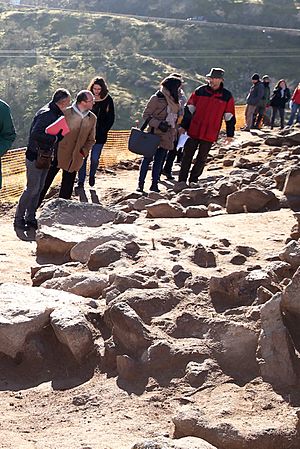Cerro del Bu facts for kids
The Cerro del Bu is an archaeological site (a place where old things are found) in Toledo, Spain. It's on a hill next to the Tagus river. This special hill is called Bu.
Contents
Discovering Cerro del Bu
This important place is on a hill near the city of Toledo. From the outside, it looked like there were old building parts hidden in the ground. The hill is high and steep. This made it a great spot for people to live safely. It was easy to defend from enemies.
Since 1980, scientists have been digging here. They found that people lived on this hill at different times. They uncovered many layers of history.
Life in the Bronze Age
The oldest signs of people are some flint tools. These tools show that people lived here a very long time ago. The most important time for the hill was during the Bronze Age. This was when people used bronze to make tools and weapons.
During the Bronze Age, people built homes on the hill. They lived in small cottages. Scientists found parts of these homes still standing. The people living here were mostly shepherds. They raised sheep and bovine (cattle). This means their main job was taking care of animals.
A Medieval Settlement
Later, during the Arab period, a small group of people lived on the hill. This was a temporary settlement. It was used for military reasons. They needed a strategic spot to watch over the area.
Scientists found remains of this Arab settlement at the top of the hill. It seems this settlement ended suddenly. There are signs of ash, but the walls fell down before any big fire. This suggests it might have been destroyed on purpose.
Protecting History
The Cerro del Bu is a very important historical place. On April 28, 1992, it was declared a Bien de Interés Cultural. This means it is a protected archaeological zone. This special status helps keep the site safe. It ensures that this piece of history is preserved for everyone. The decision was published in the Official Gazette of Castile-La Mancha on May 20, 1992.
Images for kids
See also
 In Spanish: Cerro del Bu para niños
In Spanish: Cerro del Bu para niños
 | Victor J. Glover |
 | Yvonne Cagle |
 | Jeanette Epps |
 | Bernard A. Harris Jr. |



